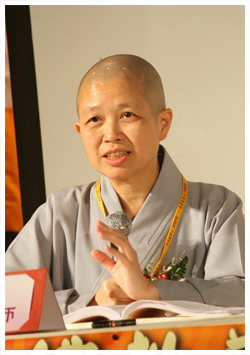Chao-hwei Shih
Shih Chao-Hwei's background
 Venerable Chao-Hwei was born in Yangon in Myanmar (Burma) in 1957. In 1965, she and her family moved to Taiwan. In 1978, aged 21, she declared that she wished to become a Buddhist nun. In 1979, she graduated from National Taiwan Normal University. Venerable Chao-Hwei was born in Yangon in Myanmar (Burma) in 1957. In 1965, she and her family moved to Taiwan. In 1978, aged 21, she declared that she wished to become a Buddhist nun. In 1979, she graduated from National Taiwan Normal University.
Venerable started to teach at Fu Jen Catholic Universityin February 1994. In September 1997, she also started teaching Religious Studies at Hsuan Chuang University, where she is currently a Professor of Religious Studies and Chair of this department. From 2010, Ven. Chao-Hwei has also been serving as Dean in the Faculty of Arts. In June 2004, she founded the Research Centre for Applied Ethics (of which she is currently the director). She is also the spiritual mentor the Graduate Institute of Hong Shih Buddhist College.
Ven. Chao-Hwei has led a number of nation-wide social movements. Among them, the urge to make "Vesak Day a National Holiday" in 1999 was highly praised by both local and overseas Buddhists. She is the founder of the Life Conservationist Association of the Republic of China, and served as its President from 1993 to 1999.
She has facilitated the legislation of the "Wildlife Conservation Act" and the "Animal Protection Act." Adhering to the compassionate Buddhist spirit to care for all sentient beings, she has urged the public to stop the abuse and cruel treatment of animals in all possible situations and contexts.
In March 2001, the announcement of abolishment of The Eight Garudhammas by Venerable Chao-Hwei has raised international attention towards the Buddhist gender equality movement. In November 2007, she convened an international conference entitled “Religious Culture & Gender Ethics" and received much recognition from international academics, religious circles and feminist activists. In August 2012, Venerable Chao-Hwei presided over a same-sex buddhist wedding which not only gained public acknowledgement, but has been the only listed event of Taiwan into the New York Times top 100 events for 2012.
When the Legislature passed a bill allowing "economically disadvantaged regions" to legalize casinos, the venerable nun was elected to serve as the Director of the Coalition against Gambling in Taiwan, and urged many NGOs to put up a strong resistance to this socially corrosive policy. Finally, having launched the 'Against Gambling' movement, she successfully led a referendum on whether or not to build casinos in Penghu Island on September 26, 2009. Also noteworthy is her campaign to ban gambling on horses in Taiwan, which was successfully pushed through Parliament.
Ven. Chao-Hwei has written many articles on environmental conservation and ecological protection, human rights and issues concerning religion and politics. She voices her opinion from the Buddhist point of view, and publishes these articles in several major newspapers in Taiwan. On the 31st of March 2001, Ven. Chao-Hwei officially declared the "Abolition of the Eight Precepts for Nuns (attha garu-dhamma)." This declaration aims to clarify that these precepts were not codified by the Buddha himself. Anyone who wishes to follow and uphold the Buddha's teaching of equality should avoid abiding by these precepts, as they strongly discriminate against females.
On the 4th of May 2007, she was awarded the 48th Chinese Literature and Arts Medal for her outstanding contributions to cultural debates. She was also awarded the International Outstanding Women in Buddhism Medal on March 6th, 2009 and The Person of the Year Prize for social movements on December 28th, 2012. Together with His Holiness the Dalai Lama, she has been appointed as the spiritual mentor of INEB, the International Network of Engaged Buddhists, founded by the renowned Thai Buddhist reformer, Sulak Sivaraksa.
From 1995 till August 2013, she has written and published a total of 27 books and over 70 research papers. The books include: Buddhist Ethics, A Contemporary Interpretation of the Buddha's monastic Regulations (Vinaya), The Normative Ethics of Buddhism, and Following in the Historical Footsteps of the Practice of the Bodhisattva Path in Human Form. |

